Fall of Singapore - papers of Charles Laurie Price, part 2
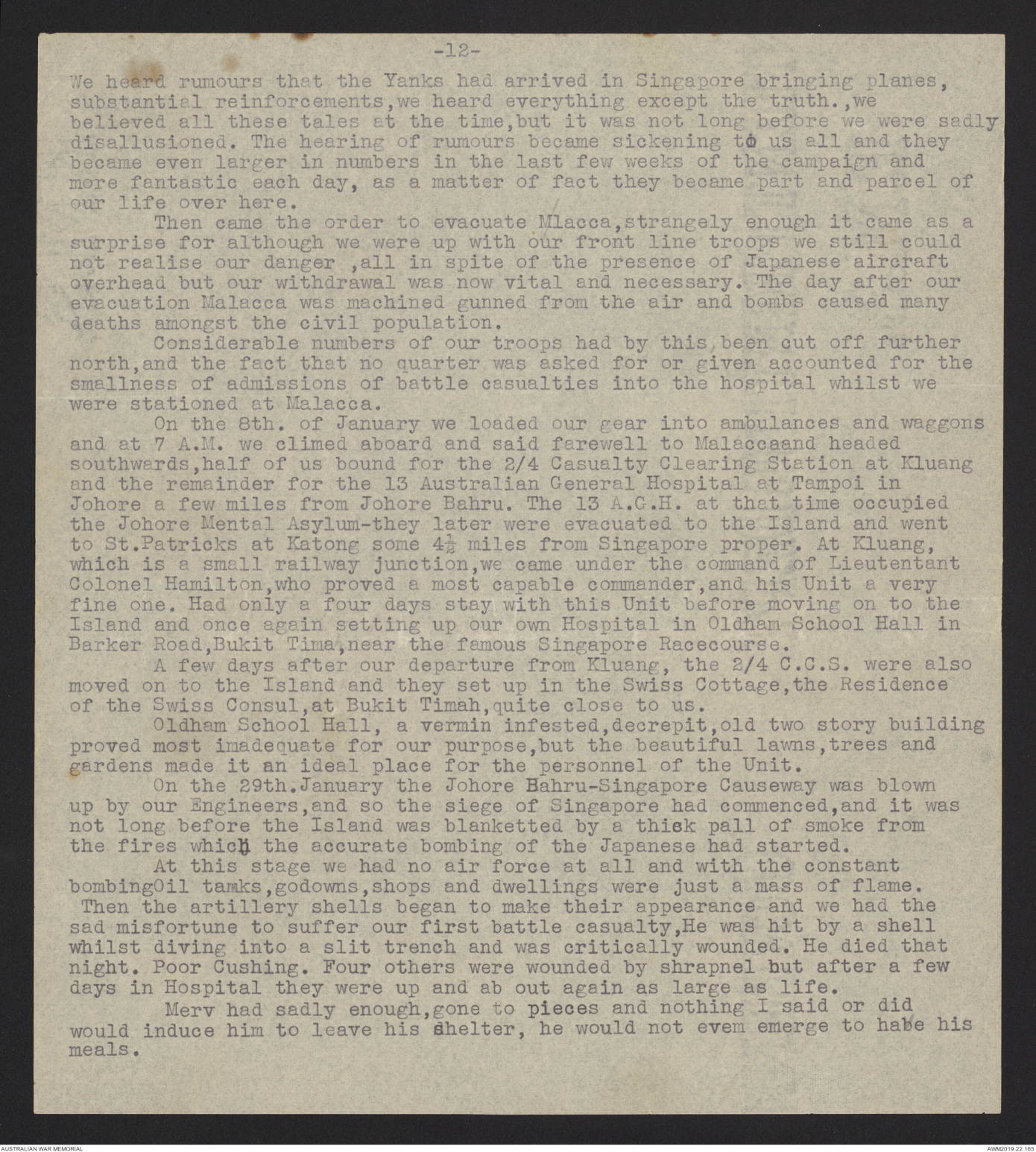
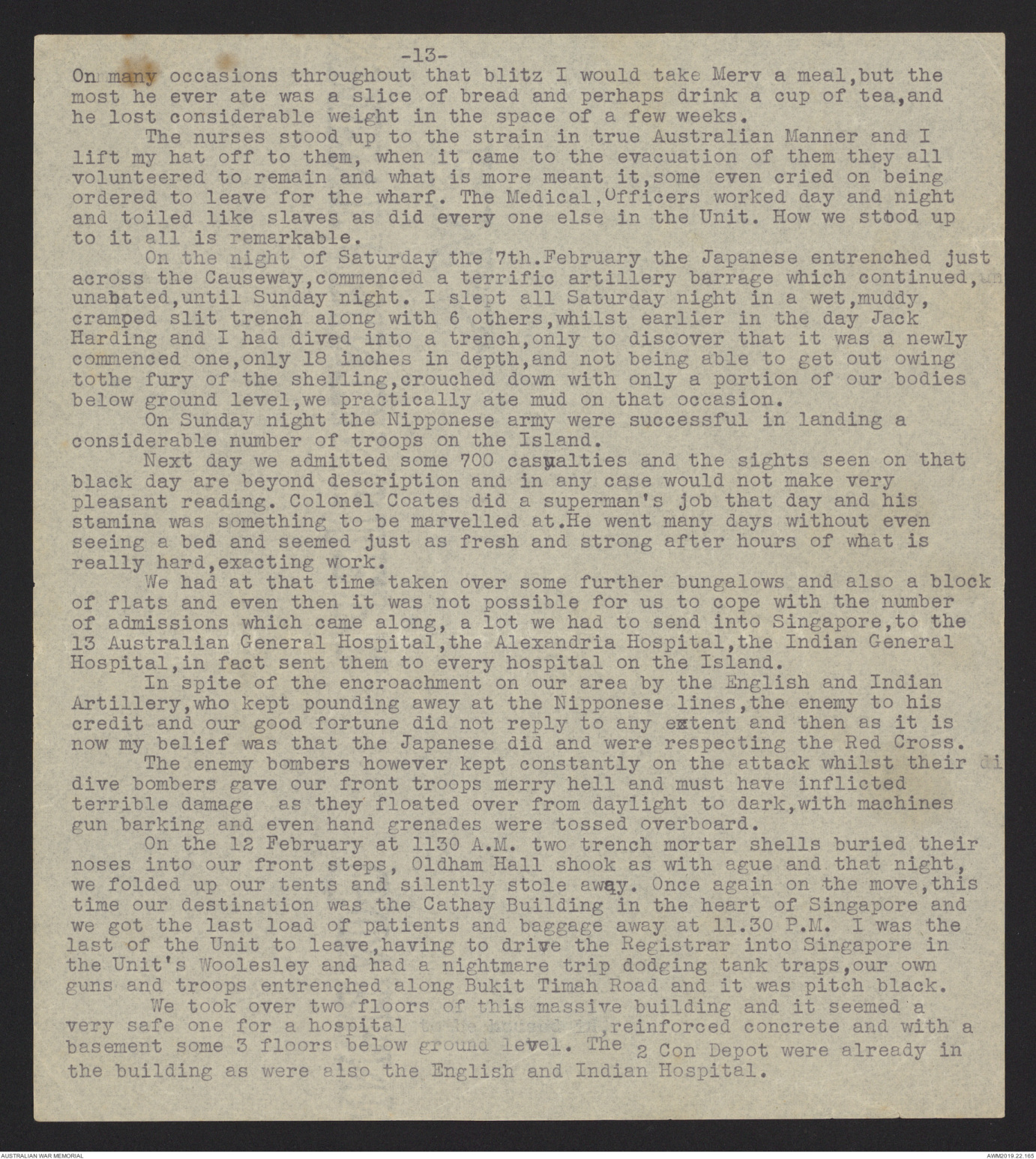
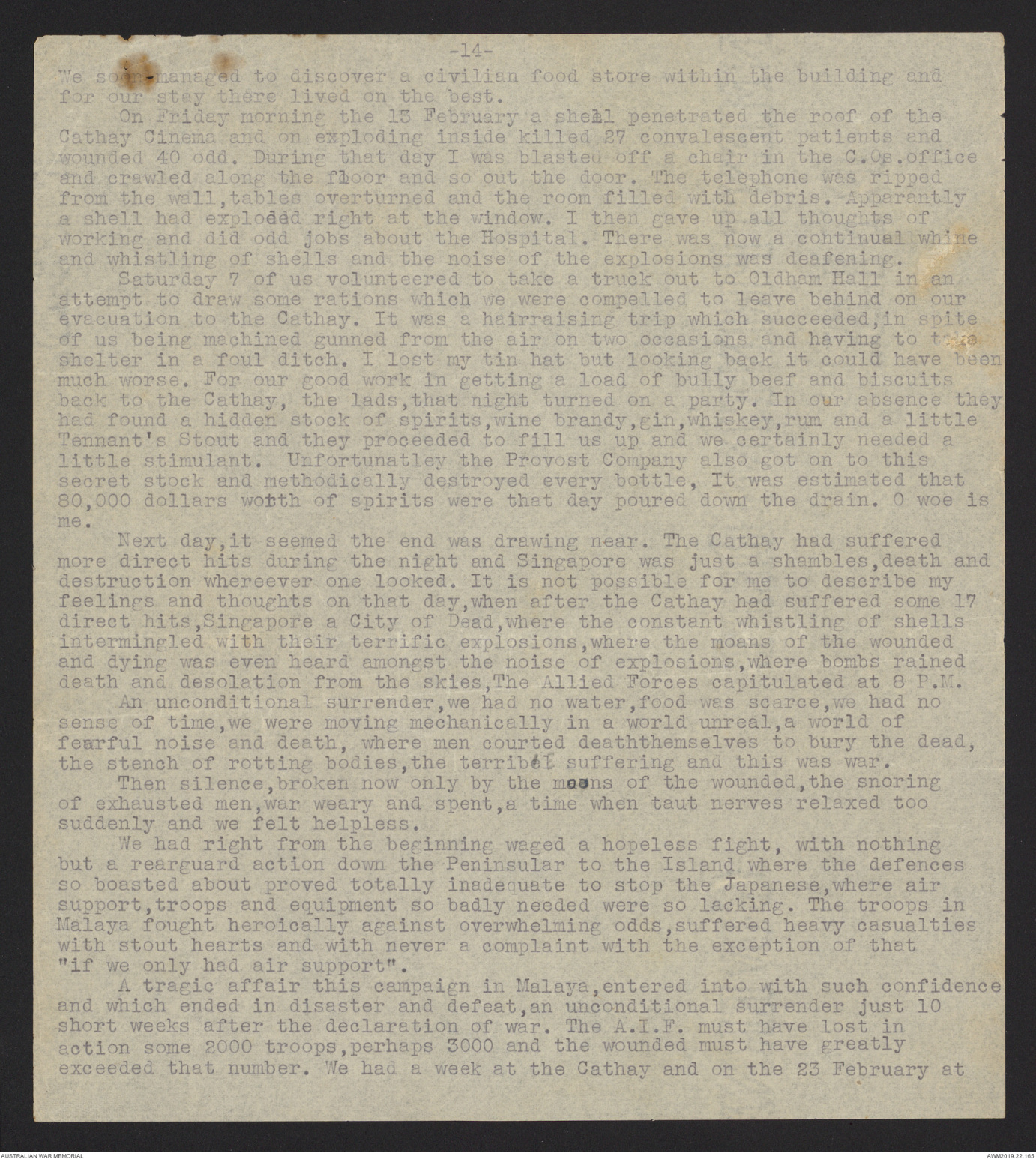
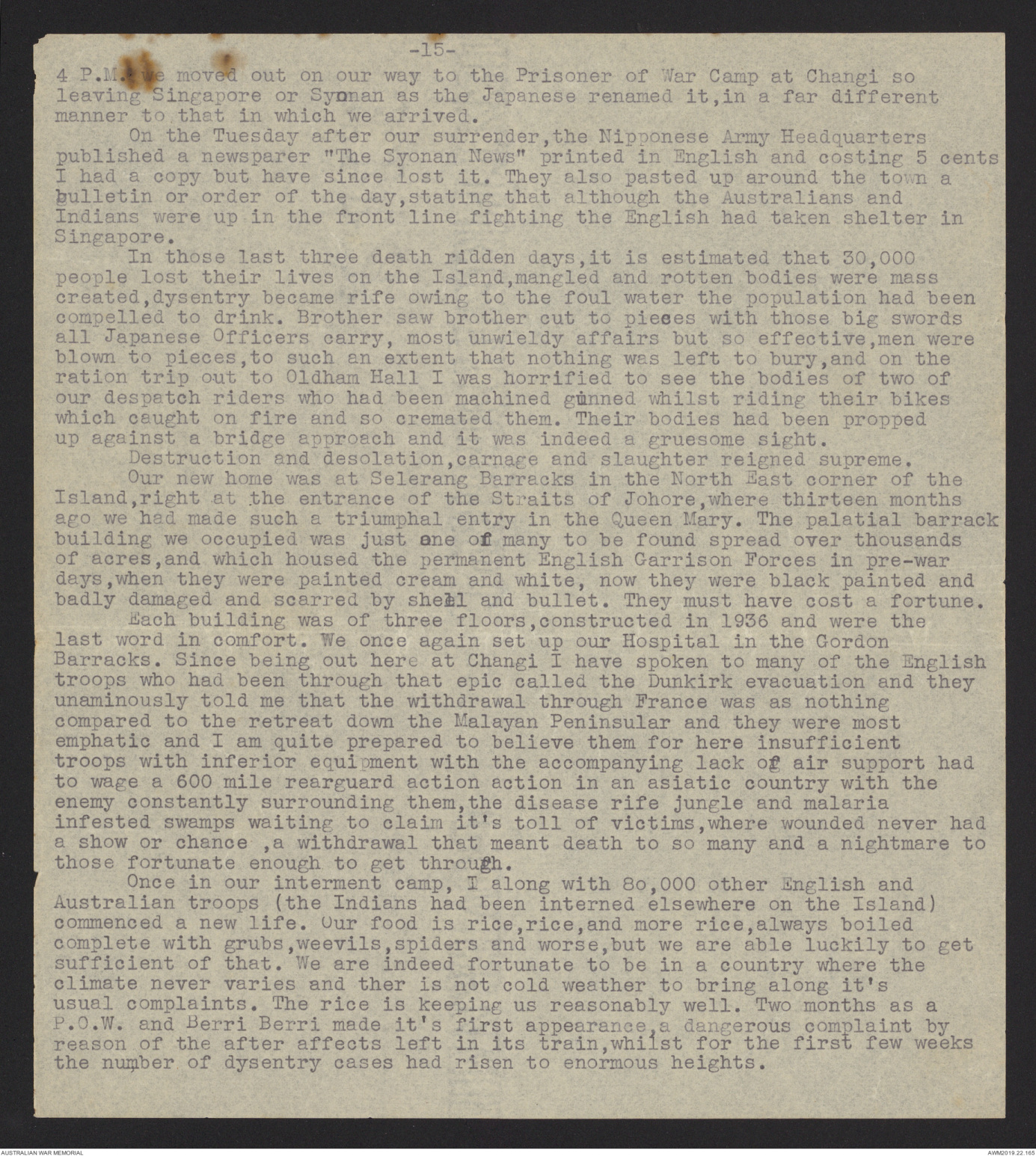
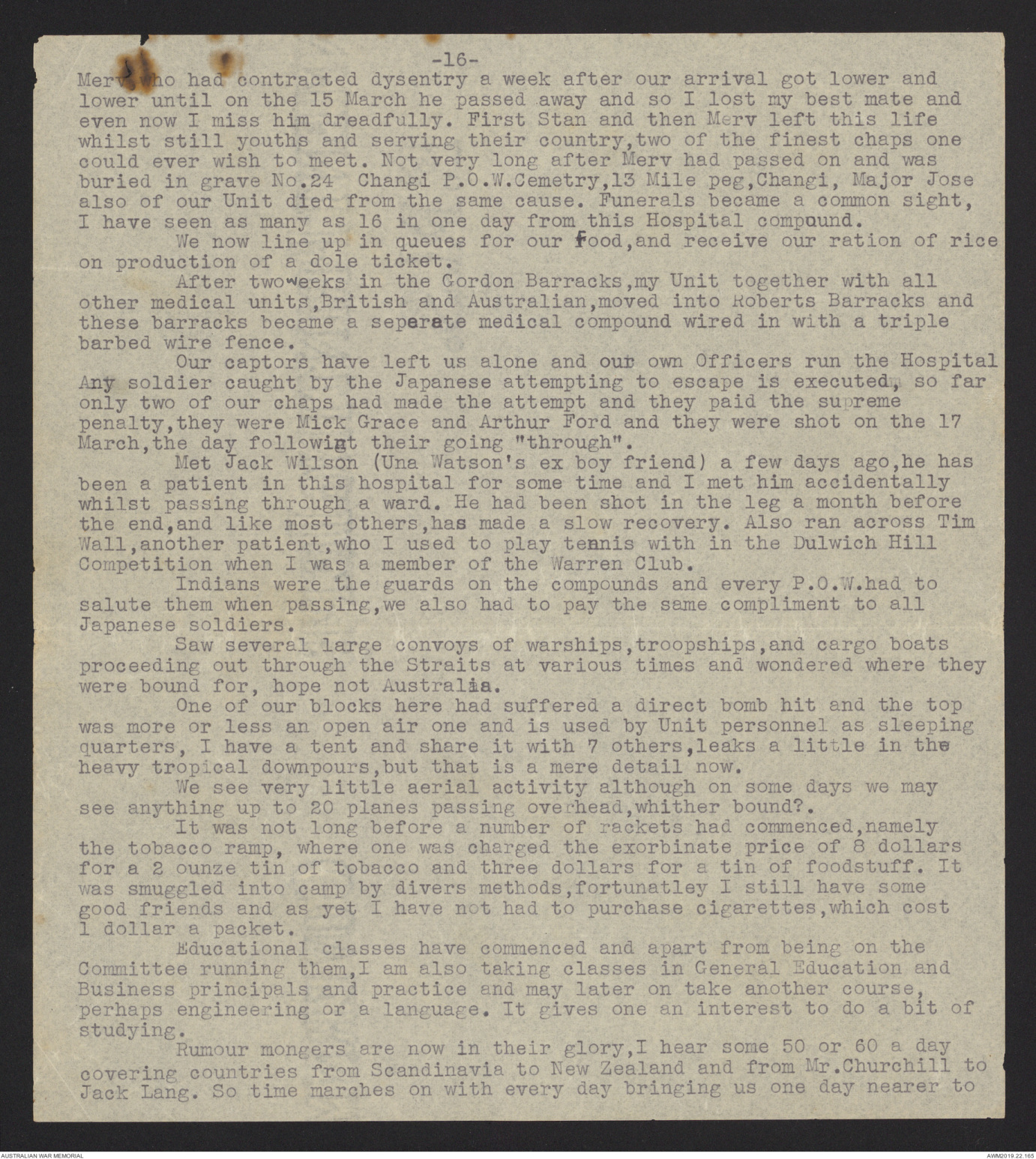
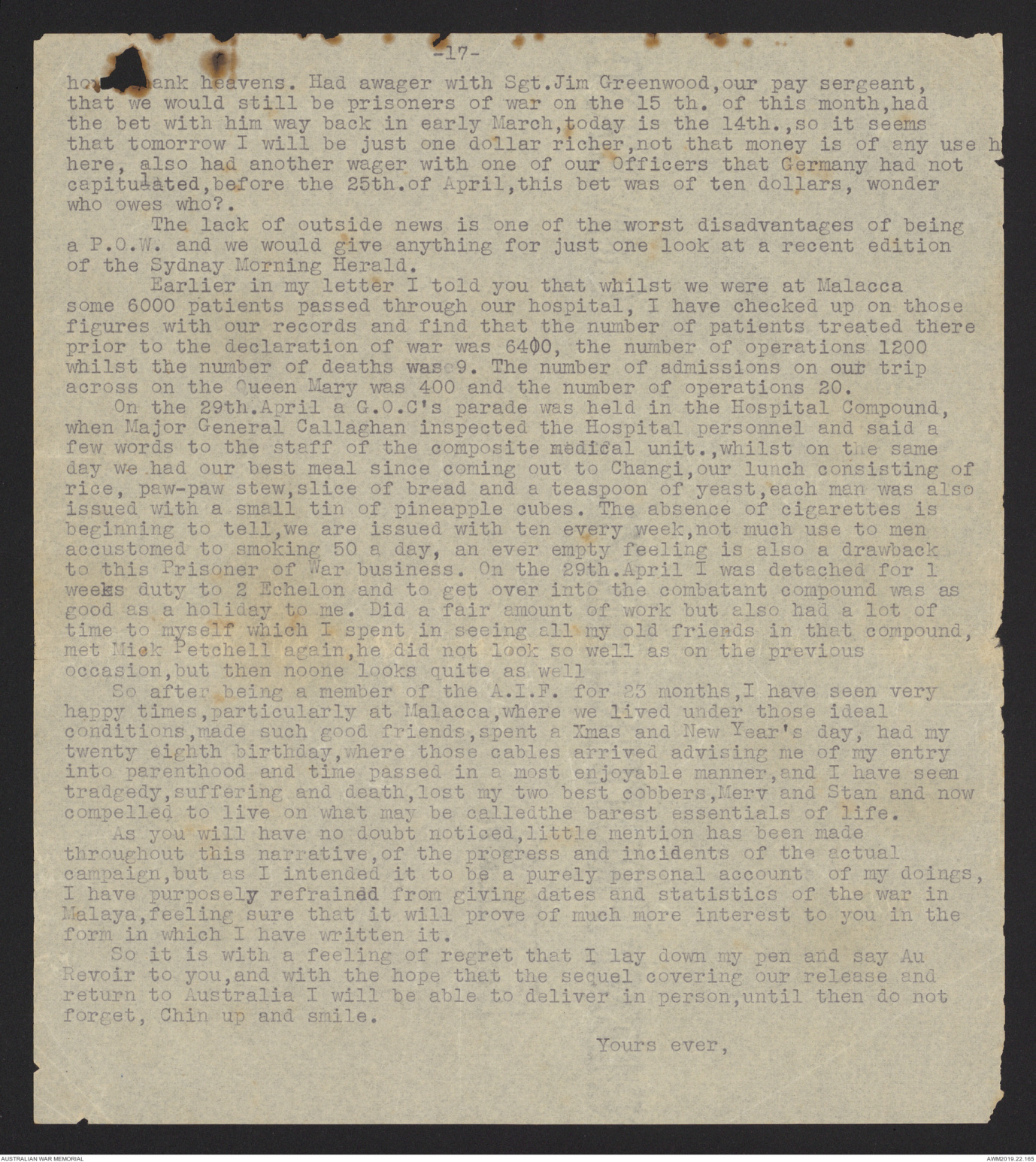
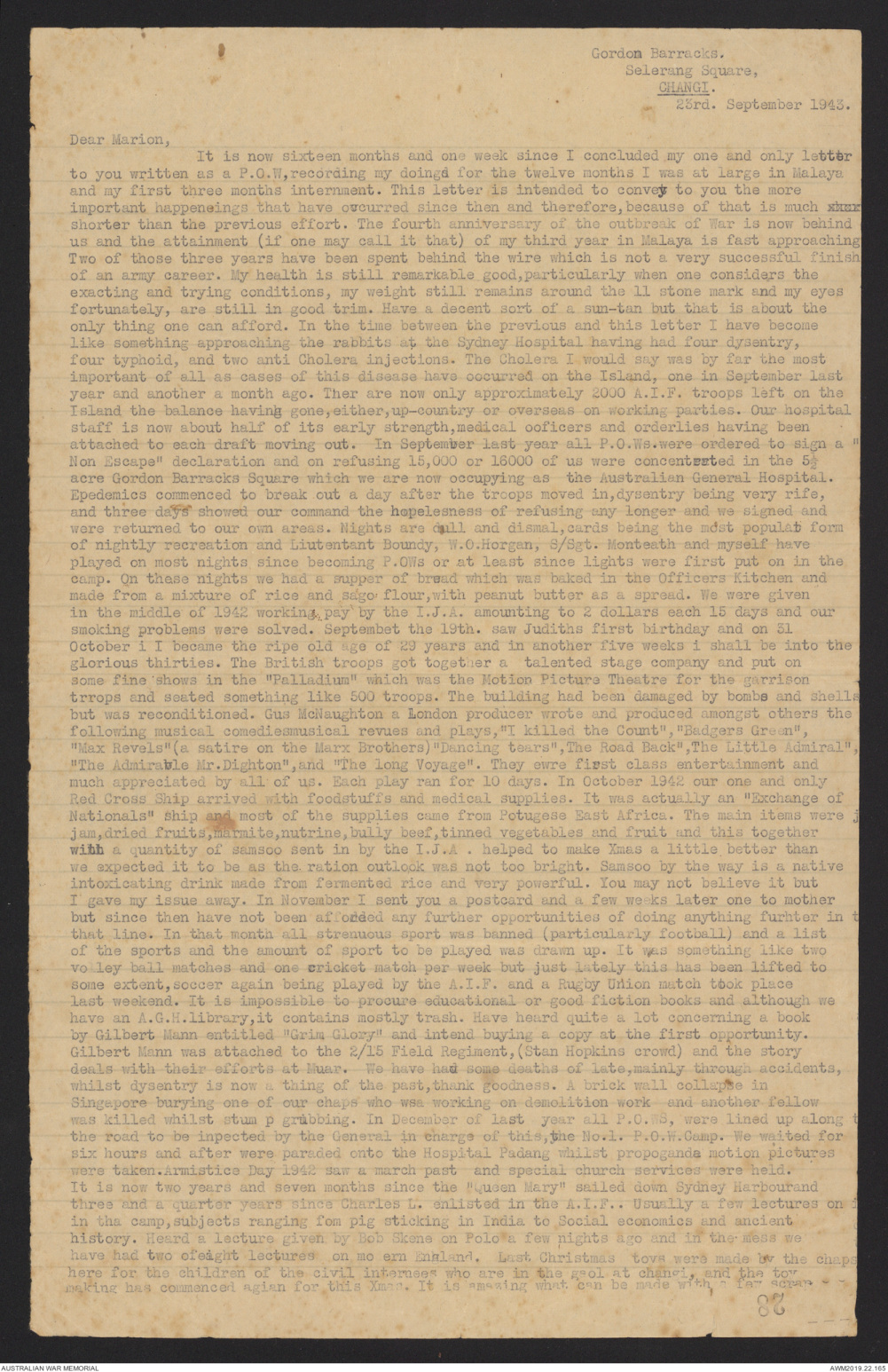
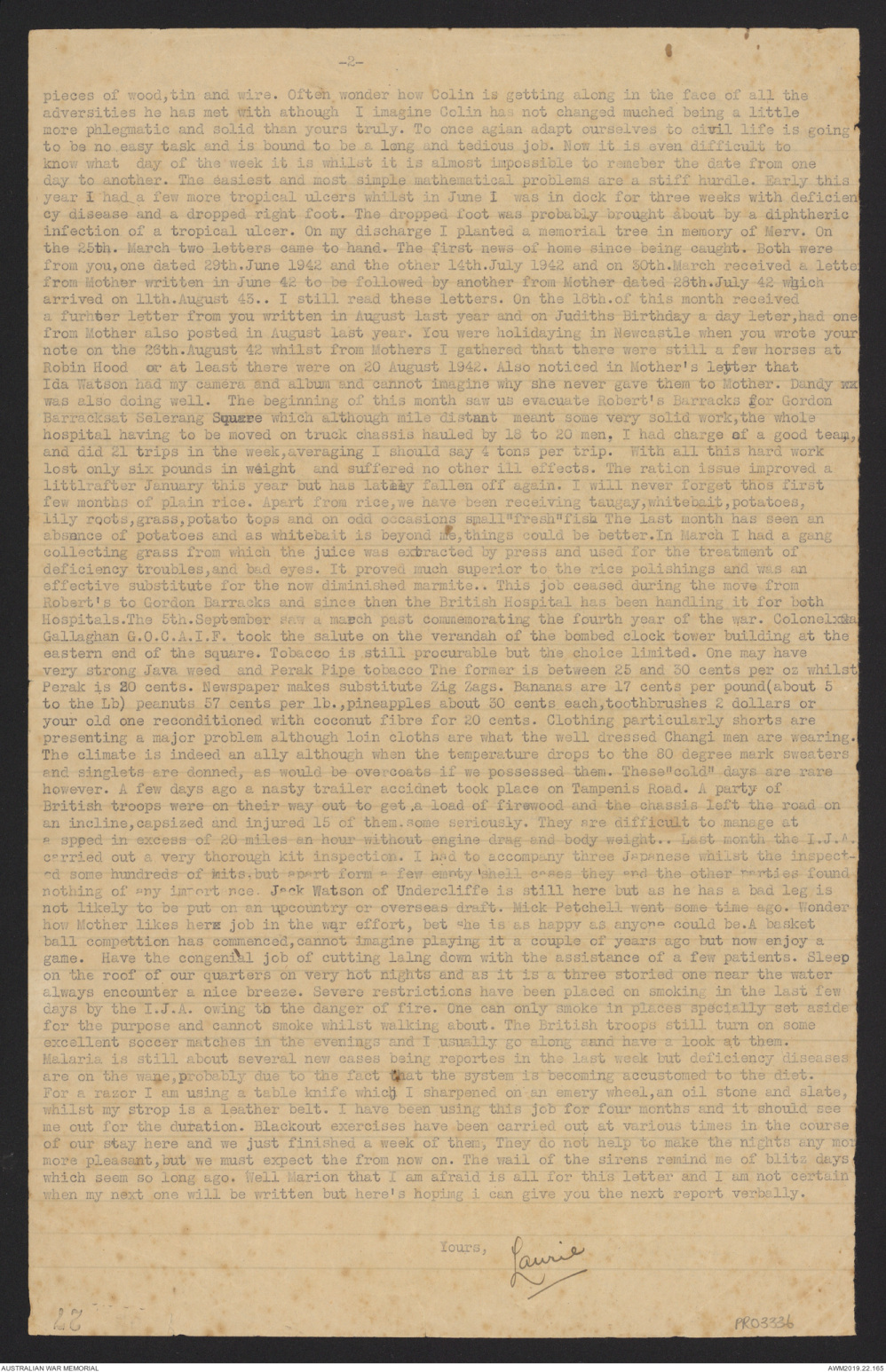
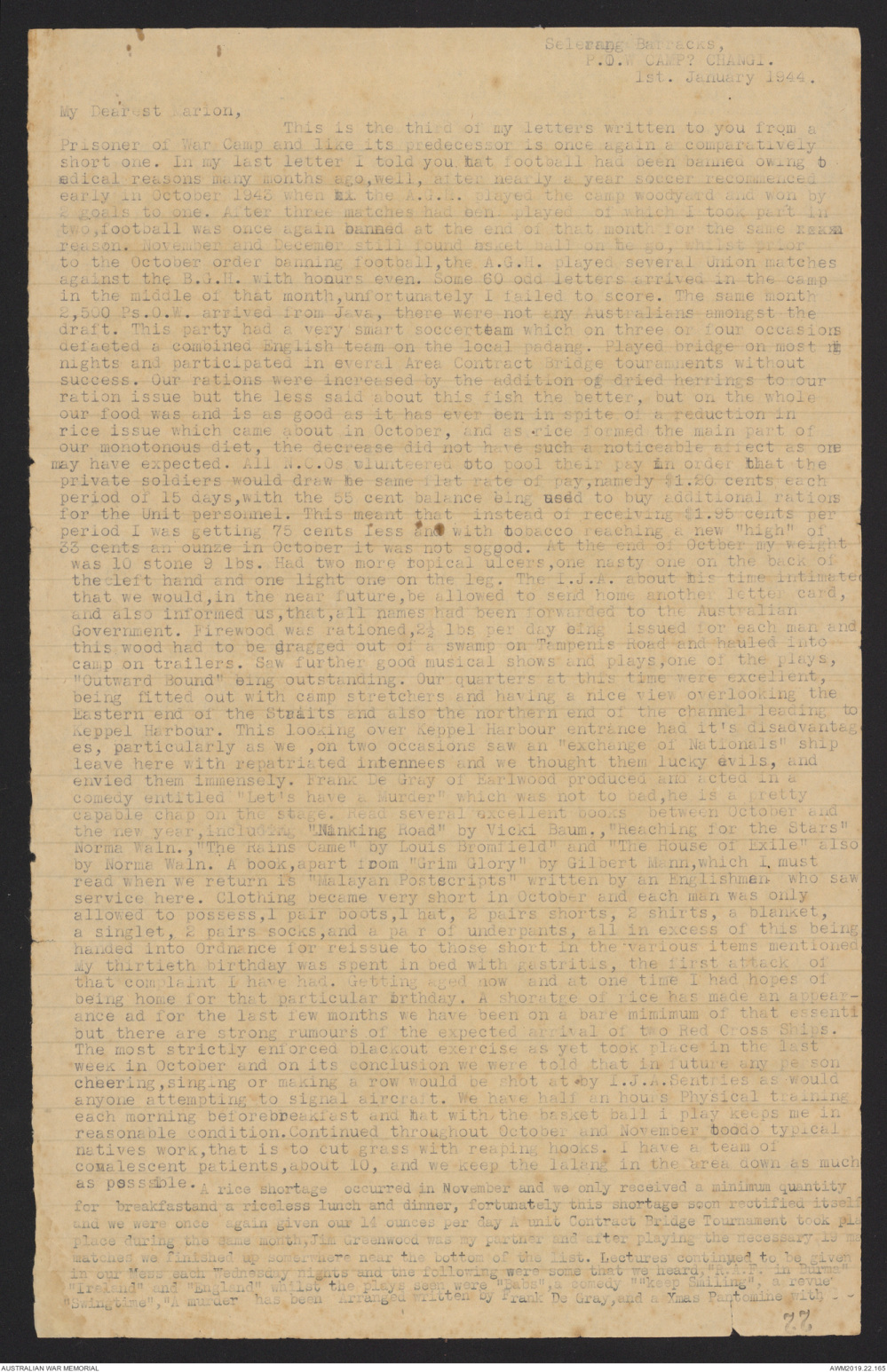
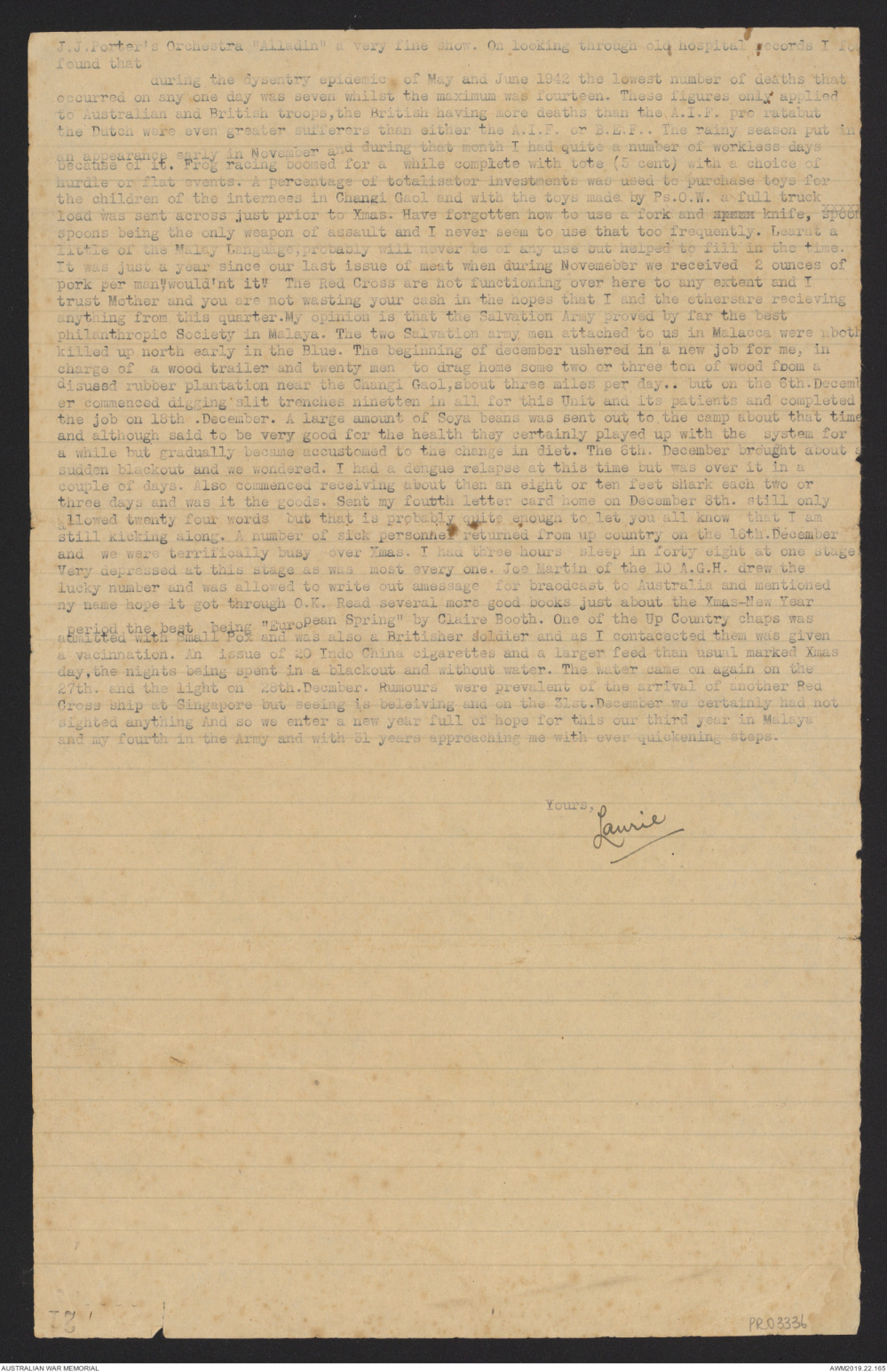
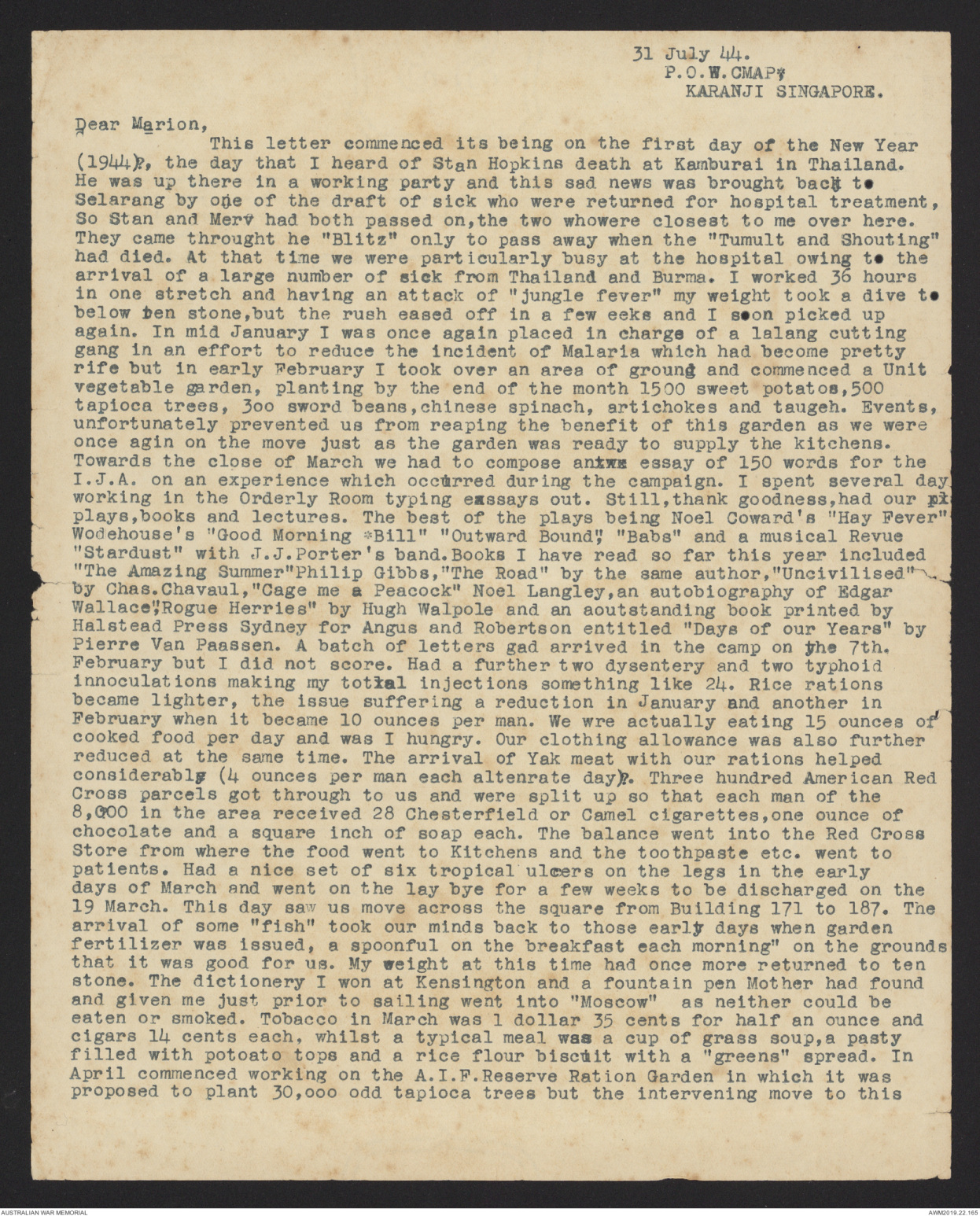
-12-
We heard rumours that the Yanks had arrived in Singapore bringing planes,
substantial reinforcements , we heard everything except the truth. , we
believed all these tales at the time, but it was not long before we were sadly
disallusioned. The hearing of rumours became sickening to us all and they
became even larger in numbers in the last few weeks of the campaign and
more fantastic each day, as a matter of fact they became part and parcel of
our life over here.
Then came the order to evacuate Mlacca, strangely enough it came as a
surprise for although we were up with our front line troops we still could
not realise our danger, all in spite of the presence of Japanese aircraft
overhead but our withdrawal was now vital and necessary. The day after our
evacuation Malacca was machined gunned from the air and bombs caused many
deaths amongst the civil population.
Considerable numbers of our troops had by this, been cut off further
north, and the fact that no quarter was asked for or given accounted for the
smallness of admissions of battle casualties into the hospital whilst we
were stationed at Malacca.
On the 8th. of January we loaded our gear into ambulances and waggons
and at 7 A.M. we climed aboard and said farewell to Malacca and headed
southwards, half of us bound for the 2/4 Casualty Clearing Station at Kluang
and the remainder for the 13 Australian General Hospital at Tampoi in
Johore a few miles from Johore Bahru. The 13 A.G.H. at that time occupied
the Johore Mental Asylum-they later were evacuated to the Island and went
to St. Patricks at Katong some 4 1/2 miles from Singapore proper. At Kluang,
which is a small railway junction, we came under the command of Lieutentant
Colonel Hamilton,who proved a most capable commander ,and his Unit a very
fine one. Had only a four days stay with this Unit before moving on to the
Island and once again setting up our own Hospital in Oldham School Hall in
Barker Road, Bukit Tima, near the famous Singapore Racecourse.
A few days after our departure from Kluang, the 2/4 C.C.S. were also
moved on to the Island and they set up in the Swiss Cottage, the Residence
of the Swiss Consul, at Bukit Timah, quite close to us.
Oldham School Hall, a vermin infested, decrepit,old two story building
proved most imadequate for our purpose,but the beautiful lawns, trees and
gardens made it an ideal place for the personnel of the Unit.
On the 29th. January the Johore Bahru-Singapore Causeway was blown
up by our Engineers, and so the siege of Singapore had commenced, and it was
not long before the Island was blanketted by a thick pall of smoke from
the fires which the accurate bombing of the Japanese had started.
At this stage we had no air force at all and with the constant
bombing Oil tanks, godowns, shops and dwellings were just a mass of flame.
Then the artillery shells began to make their appearance and we had the
sad misfortune to suffer our first battle casualty, He was hit by a shell
whilst diving into a slit trench and was critically wounded. He died that
night. Poor Cushing. Four others were wounded by shrapnel hut after a few
days in Hospital they were up and about again as large as life.
Merv had sadly enough, gone to pieces and nothing I said or did
would induce him to leave his shelter, he would not evem emerge to have his
meals.
-13-
On many occasions throughout that blitz I would take Merv a meal,but the
most he ever ate was a slice of bread and perhaps drink a cup of tea,and
he lost considerable weight in the space of a few weeks.
The nurses stood up to the strain in true Australian Manner and I
lift my hat off to them, when it came to the evacuation of them they all
volunteered to remain and what is more meant it,some even cried on being
ordered to leave for the wharf. The Medical,Officers worked day and night
and toiled like slaves as did every one else in the Unit. How we stood up
to it all is remarkable.
On the night of Saturday the 7th. February the Japanese entrenched just
across the Causeway,commenced a terrific artillery barrage which continued,
unabated, until Sunday night. I slept all Saturday night in a wet,muddy,
cramped slit trench along with 6 others,whilst earlier in the day Jack
Harding and I had dived into a trench,only to discover that it was a newly
commenced one,only 18 inches in depth,and not being able to get out owing
tothe fury of the shelling,crouched down with only a portion of our bodies
below ground level, we practically ate mud on that occasion.
On Sunday night the Nipponese army were successful in landing a
considerable number of troops on the Island.
Next day we admitted some 700 casualties and the sights seen on that
black day are beyond description and in any case would not make very
pleasant reading. Colonel Coates did a superman's job that day and his
stamina was something to be marvelled at.He went many days without even
seeing a bed and seemed just as fresh and strong after hours of what is
really hard,exacting work.
We had at that time taken over some further bungalows and also a block
of flats and even then it was not possible for us to cope with the number
of admissions which came along, a lot we had to send into Singapore,to the
13 Australian General Hospital,the Alexandria Hospital,the Indian General
Hospital,in fact sent them to every hospital on the Island.
In spite of the encroachment on our area by the English and Indian
Artillery,who kept pounding away at the Nipponese lines,the enemy to his
credit and our good fortune did not reply to any extent and then as it is
now my belief was that the Japanese did and were respecting the Red Cross.
The enemy bombers however kept constantly on the attack whilst their
dive bombers gave our front troops merry hell and must have inflicted
terrible damage as they floated over from daylight to dark,with machines
gun barking and even hand grenades were tossed overboard.
On the 12 February at 1130 A.M. two trench mortar shells buried their
noses into our front steps, Oldham Hall shook as with ague and that night,
we folded up our tents and silently stole away. Once again on the move,this
time our destination was the Cathay Building in the heart of Singapore and
we got the last load of patients and baggage away at 11.30 P.M. I was the
last of the Unit to leave,having to drive the Registrar into Singapore in
the Unit's Woolesley and had a nightmare trip dodging tank traps,our own
guns and troops entrenched along Bukit Timah Road and it was pitch black.
We took over two floors of this massive building and it seemed a
very safe one for a hospital [[to be housed in?]],reinforced concrete and with a
basement some 3 floors below ground level. The 2 Con Depot were already in
the building as were also the English and Indian Hospital.
-14-
We soon managed to discover a civilian food store within the building and
for our stay there lived on the best.
On Friday morning the 13 February a shell penetrated the roof of the
Cathay Cinema and on exploding inside killed 27 convalescent patients and
wounded 40 odd. During that day I was blasted off a chair in the C.Os.office
and crawled along the floor and so out the door. The telephone was ripped
from the wall, tables overturned and the room filled with debris. Apparantly
a shell had exploded right at the window. I then gave up all thoughts of
working and did odd jobs about the Hospital. There was now a continual whine
and whistling of shells and the noise of the explosions was deafening.
Saturday 7 of us volunteered to take a truck out to Oldham Hall in an
attempt to draw some rations which we were compelled to leave behind on our
evacuation to the Cathay. It was a hairraising trip which succeeded,in spite
of us being machined gunned from the air on two occasions and having to take
shelter in a foul ditch. I lost my tin hat but looking back it could have been
much worse. For our good work in getting a load of bully beef and biscuits
back to the Cathay, the lads,that night turned on a party. In our absence they
had found a hidden stock of spirits,wine brandy,gin,whiskey,rum and a little
Tennant's Stout and they proceeded to fill us up and we certainly needed a
little stimulant. Unfortunatley the Provost Company also got on to this
secret stock and methodically destroyed every bottle, It was estimated that
80,000 dollars worth of spirits were that day poured down the drain. O woe is
me.
Next day it seemed the end was drawing near. The Cathay had suffered
more direct hits during the night and Singapore was just a shambles, death and
destruction whereever one looked. It is not possible for me to describe my
feelings and thoughts on that day,when after the Cathay had suffered some 17
direct hits,Singapore a City of Dead,where the constant whistling of shells
intermingled with their terrific explosions,where the moans of the wounded
and dying was even heard amongst the noise of explosions,where bombs rained
death and desolation from the skies,The Allied Forces capitulated at 8 P.M.
An unconditional surrender, we had no water, food was scarce, we had no
sense of time,we were moving mechanically in a world unreal,a world of
fearful noise and death, where men courted deaththemselves to bury the dead,
the stench of rotting bodies,the terriblE suffering and this was war.
Then silence,broken now only by the moans of the wounded,the snoring
of exhausted men,war weary and spent,a time when taut nerves relaxed too
suddenly and we felt helpless.
We had right from the beginning waged a hopeless fight, with nothing
but a rearguard action down the Peninsular to the Island where the defences
so boasted about proved totally inadequate to stop the Japanese,where air
support, troops and equipment so badly needed were so lacking. The troops in
Malaya fought heroically against overwhelming odds,suffered heavy casualties
with stout hearts and with never a complaint with the exception of that
"if we only had air support"
A tragic affair this campaign in Malaya,entered into with such confidence
and which ended in disaster and defeat,an unconditional surrender just 10
short weeks after the declaration of war. The A.I.F. must have lost in
action some 2000 troops,perhaps 3000 and the wounded must have greatly
exceeded that number. We had a week at the Cathay and on the 23 February at
-15-
4 P.M. we moved out on our way to the Prisoner of War Camp at Changi so
leaving Singapore or Syonan as the Japanese renamed it,in a far different
manner to that in which we arrived.
On the Tuesday after our surrender,the Nipponese Army Headquarters
published a newsparer "The Syonan News" printed in English and costing 5 cents
I had a copy but have since lost it. They also pasted up around the town a
bulletin or order of the day, stating that although the Australians and
Indians were up in the front line fighting the English had taken shelter in
Singapore.
In those last three death ridden days,it is estimated that 30,000
people lost their lives on the Island,mangled and rotten bodies were mass
created,dysentry became rife owing to the foul water the population had been
compelled to drink. Brother saw brother cut to pieces with those big swords
all Japanese Officers carry, most unwieldy affairs but so effective,men were
blown to pieces,to such an extent that nothing was left to bury, and on the
ration trip out to Oldham Hall I was horrified to see the bodies of two of
our despatch riders who had been machined gunned whilst riding their bikes
which caught on fire and so cremated them. Their bodies had been propped
up against a bridge approach and it was indeed a gruesome sight.
Destruction and desolation,carnage and slaughter reigned supreme.
Our new home was at Selerang Barracks in the North East corner of the
Island,right at the entrance of the Straits of Johore,where thirteen months
ago we had made such a triumphal entry in the Queen Mary. The palatial barrack
building we occupied was just one of many to be found spread over thousands
of acres,and which housed the permanent English Garrison Forces in pre-war
days, when they were painted cream and white, now they were black painted and
badly damaged and scarred by shell and bullet. They must have cost a fortune.
Each building was of three floors,constructed in 1936 and were the
last word in comfort. We once again set up our Hospital in the Gordon
Barracks. Since being out here at Changi I have spoken to many of the English
troops who had been through that epic called the Dunkirk evacuation and they
unaminously told me that the withdrawal through France was as nothing
compared to the retreat down the Malayan Peninsular and they were most
emphatic and I am quite prepared to believe them for here insufficient
troops with inferior equipment with the accompanying lack of air support had
to wage a 600 mile rearguard action action in an asiatic country with the
enemy constantly surrounding them,the disease rife jungle and malaria
infested swamps waiting to claim it's toll of victims,where wounded never had
a show or chance ,a withdrawal that meant death to so many and a nightmare to
those fortunate enough to get through.
Once in our interment camp, I along with 80,000 other English and
Australian troops (the Indians had been interned elsewhere on the Island)
commenced a new life. Our food is rice,rice,and more rice,always boiled
complete with grubs, weevils,spiders and worse,but we are able luckily to get
sufficient of that. We are indeed fortunate to be in a country where the
climate never varies and ther is not cold weather to bring along it's
usual complaints. The rice is keeping us reasonably well. Two months as a
P.O.W. and Berri Berri made it's first appearance,a dangerous complaint by
reason of the after affects left in its train,whilst for the first few weeks
the number of dysentry cases had risen to enormous heights.
-16-
Merv, had contracted dysentry a week after our arrival got lower and
lower until on the 15 March he passed away and so I lost my best mate and
even now I miss him dreadfully. First Stan and then Merv left this life
whilst still youths and serving their country,two of the finest chaps one
could ever wish to meet. Not very long after Merv had passed on and was
buried in grave No.24 Changi P.O.W.Cemetry,13 Mile peg,Changi, Major Jose
also of our Unit died from the same cause. Funerals became a common sight,
I have seen as many as 16 in one day from this Hospital compound.
We now line up in queues for our food,and receive our ration of rice
on production of a dole ticket.
After twoweeks in the Gordon Barracks,my Unit together with all
other medical units,British and Australian,moved into Roberts Barracks and
these barracks became a seperate medical compound wired in with a triple
barbed wire fence.
Our captors have left us alone and our own Officers run the Hospital
Any soldier caught by the Japanese attempting to escape is executed, so far
only two of our chaps had made the attempt and they paid the supreme
penalty,they were Mick Grace and Arthur Ford and they were shot on the 17
March, the day followigt their going "through".
Met Jack Wilson (Una Watson's ex boy friend) a few days ago,he has
been a patient in this hospital for some time and I met him accidentally
whilst passing through a ward. He had been shot in the leg a month before
the end,and like most others, has made a slow recovery. Also ran across Tim
Wall, another patient, who I used to play tennis with in the Dulwich Hill
Competition when I was a member of the Warren Club.
Indians were the guards on the compounds and every P.O.W.had to
salute them when passing,we also had to pay the same compliment to all
Japanese soldiers.
Saw several large convoys of warships,troopships,and cargo boats
proceeding out through the Straits at various times and wondered where they
were bound for, hope not Australia.
One of our blocks here had suffered a direct bomb hit and the top
was more or less an open air one and is used by Unit personnel as sleeping
quarters, I have a tent and share it with 7 others,leaks a little in the
heavy tropical downpours,but that is a mere detail now.
We see very little aerial activity although on some days we may
see anything up to 20 planes passing overhead,whither bound?.
It was not long before a number of rackets had commenced,namely
the tobacco ramp, where one was charged the exorbinate price of 8 dollars
for a 2 ounze tin of tobacco and three dollars for a tin of foodstuff. It
was smuggled into camp by divers methods,fortunatley I still have some
good friends and as yet I have not had to purchase cigarettes,which cost
1 dollar a packet.
Educational classes have commenced and apart from being on the
Committee running them,I am also taking classes in General Education and
Business principals and practice and may later on take another course,
perhaps engineering or a language. It gives one an interest to do a bit of
studying.
Rumour mongers are now in their glory, I hear some 50 or 60 a day
covering countries from Scandinavia to New Zealand and from Mr.Churchill to
Jack Lang. So time marches on with every day bringing us one day nearer to
-17-
ho ank heavens. Had awager with Sgt. Jim Greenwood,our pay sergeant,
that we would still be prisoners of war on the 15 th. of this month, had
the bet with him way back in early March, today is the 14th.,so it seems
that tomorrow I will be just one dollar richer,not that money is of any use h
here, also had another wager with one of our Officers that Germany had not
capitulated,before the 25th.of April,this bet was of ten dollars, wonder
who owes who?.
The lack of outside news is one of the worst disadvantages of being
a P.O.W. and we would give anything for just one look at a recent edition
of the Sydnay Morning Herald.
Earlier in my letter I told you that whilst we were at Malacca
some 6000 patients passed through our hospital, I have checked up on those
figures with our records and find that the number of patients treated there
prior to the declaration of war was 6400, the number of operations 1200
whilst the number of deaths wase9. The number of admissions on our trip
across on the Queen Mary was 400 and the number of operations 20.
On the 29th.April a G.O.C's parade was held in the Hospital Compound,
when Major General Callaghan inspected the Hospital personnel and said a
few words to the staff of the composite medical unit., whilst on the same
day we had our best meal since coming out to Changi,our lunch consisting of
rice, paw-paw stew, slice of bread and a teaspoon of yeast,each man was also
issued with a small tin of pineapple cubes. The absence of cigarettes is
beginning to tell,we are issued with ten every week, not much use to men
accustomed to smoking 50 a day, an ever empty feeling is also a drawback
to this Prisoner of War business. On the 29th. April I was detached for 1
weeks duty to 2 Echelon and to get over into the combatant compound was as
good as a holiday to me. Did a fair amount of work but also had a lot of
time to myself which I spent in seeing all my old friends in that compound,
met Mick Petchell again,he did not look so well as on the previous
occasion,but then noone looks quite as well
So after being a member of the A.I.F. for 23 months,I have seen very
happy times,particularly at Malacca, where we lived under those ideal
conditions,made such good friends,spent a Xmas and New Year's day, had my
twenty eighth birthday,where those cables arrived advising me of my entry
into parenthood and time passed in a most enjoyable manner,and I have seen
tradgedy,suffering and death,lost my two best cobbers,Merv and Stan and now
compelled to live on what may be calledthe barest essentials of life.
As you will have no doubt noticed,little mention has been made
throughout this narrative,of the progress and incidents of the actual
campaign,but as I intended it to be a purely personal accounts of my doings,
I have purposely refrained from giving dates and statistics of the war in
Malaya, feeling sure that it will prove of much more interest to you in the
form in which I have written it.
So it is with a feeling of regret that I lay down my pen and say Au
Revoir to you,and with the hope that the sequel covering our release and
return to Australia I will be able to deliver in person,until then do not
forget, Chin up and smile.
Yours ever,
Gordon Barracks.
Selerang Square,
CHANGI
23rd. September 1943.
Dear Marion,
It is now sixteen months and one week since I concluded my one and only letter
to you written as a P.O.W,recording my doings for the twelve months I was at large in Malaya
and my first three months internment. This letter is intended to convey to you the more
important happeneings that have ovcurred since then and therefore,because of that is much xxxx
shorter than the previous effort. The fourth anniversary of the outbreak of War is now behind
us and the attainment (if one may call it that) of my third year in Malaya is fast approaching
Two of those three years have been spent behind the wire which is not a very successful finish
of an army career. My health is still remarkable good,particularly when one considers the
exacting and trying conditions, my weight still remains around the 11 stone mark and my eyes
fortunately, are still in good trim. Have a decent sort of a sun-tan but that is about the
only thing one can afford. In the time between the previous and this letter I have become
like something approaching the rabbits at the Sydney Hospital having had four dysentry,
four typhoid, and two anti Cholera injections. The Cholera I would say was by far the most
important of all as cases of this disease have oocurred on the Island, one in September last
year and another a month ago. Ther are now only approximately 2000 A.I.F. troops left on the
Island the balance having gone,either,up-country or overseas on working parties. Our hospital
staff is now about half of its early strength,medical ooficers and orderlies having been
attached to each draft moving out. In September last year all P.O.Ws.were ordered to sign a
Non Escape" declaration and on refusing 15,000 or 16000 of us were concentssted in the 5 1/2
acre Gordon Barracks Square which we are now occupying as the Australian General Hospital.
Epedemics commenced to break out a day after the troops moved in,dysentry being very rife,
and three days showed our command the hopelesness of refusing any longer and we signed and
were returned to our own areas. Nights are dull and dismal,cards being the most populat form
of nightly recreation and Liutentant Boundy, W.O.Horgan, S/Sgt. Monteath and myself have
played on most nights since becoming P.OWs or at least since lights were first put on in the
camp. On these nights we had a supper of bread which was baked in the Officers Kitchen and
made from a mixture of rice and sago flour, with peanut butter as a spread. We were given
in the middle of 1942 working pay by the I.J.A. amounting to 2 dollars each 15 days and our
smoking problems were solved. Septembet the 19th. saw Judiths first birthday and on 31
October i I became the ripe old age of 29 years and in another five weeks i shall be into the
glorious thirties. The British troops got together a talented stage company and put on
some fine shows in the "Palladium" which was the Motion Picture Theatre for the garrison
trrops and seated something like 500 troops. The building had been damaged by bombs and shells
but was reconditioned. Gus McNaughton a London producer wrote and produced amongst others the
following musical comediesmusical revues and plays,"I killed the Count","Badgers Green"
"Max Revels"(a satire on the Marx Brothers) "Dancing tears",The Road Back",The Little Admiral
"The Admirable Mr.Dighton", and "The long Voyage". They ewre first class entertainment and
much appreciated by all of us. Each play ran for 10 days. In October 1942 our one and only
Red Cross Ship arrived with foodstuffs and medical supplies. It was actually an "Exchange of
Nationals" ship end most of the supplies came from Potugese East Africa. The main items were
jam,dried fruits,marmite,nutrine,bully beef,tinned vegetables and fruit and this together
with a quantity of samsoo sent in by the I.J.A helped to make Xmas a little better than
we expected it to be as the ration outlook was not too bright. Samsoo by the way is a native
intoxicating drink made from fermented rice and very powerful. You may not believe it but
I gave my issue away. In November I sent you a postcard and a few weeks later one to mother
but since then have not been afforded any further opportunities of doing anything furhter in t
that line. In that month all strenuous sport was banned (particularly football) and a list
of the sports and the amount of sport to be played was drawn up. It was something like two
volley ball matches and one cricket match per week but just lately this has been lifted to
some extent, soccer again being played by the A.I.F. and a Rugby Union match took place
last weekend. It is impossible to procure educational or good fiction books and although we
have an A.G.H.library,it contains mostly trash. Have heard quite a lot concerning a book
by Gilbert Mann entitled "Grim Glory," and intend buying a copy at the first opportunity.
Gilbert Mann was attached to the 2/15 Field Regiment,(Stan Hopkins crowd) and the story
deals with their efforts at Muar. We have had some deaths of late, mainly through accidents,
whilst dysentry is now a thing of the past,thank goodness. A brick wall collapse in
Singapore burying one of our chaps who wsa working on demolition work and another fellow
was killed whilst stum p grubbing. In December of last year all P.O.WS, were lined up along t
the road to be inpected by the General in charge of this,the No.1 P.O.W.Camp. We waited for
six hours and after were paraded onto the Hospital Padang whilst propoganda motion pictures
wers taken.Armistice Day 1942 saw a march past and special church services were held.
It is now two years and seven months since the "Queen Mary" sailed down Sydney Harbourand
three and a quarter years since Charles L. enlisted in the A.I.F.. Usually a few lectures on
in tha camp,subjects ranging fom pig sticking in India to Social economics and ancient
history. Heard a lecture given by Bob Skene on Polo a few nights ago and in the mess we
have had two ofeight lectures on mo ern England. Last Christmas toys were made by the chaps
here for the children of the civil internees who are in the gaol at changi, and the toy
making has commanced agian for,this Xmas. It is amazing what can be made with a few scrap
pieces of wood,tin and wire. Often wonder how Colin is getting along in the face of all the
adversities he has met with athough I imagine Colin has not changed muched being a little
more phlegmatic and solid than yours truly. To once agian adapt ourselves to civil life is going
to be no easy task and is bound to be a long and tedious job. Now it is even difficult to
know what day of the week it is whilst it is almost impossible to remeber the date from one
day to another. The dasiest and most simple mathematical problems are a stiff hurdle. Early this
year I had a few more tropical ulcers whilst in June I was in dock for three weeks with deficien
cy disease and a dropped right foot. The dropped foot was probably brought about by a diphtheric
infection of a tropical ulcer. On my discharge I planted a memorial tree in memory of Merv. On
the 25th. March two letters came to hand. The first news of home since being caught. Both were
from you,one dated 29th. June 1942 and the other 14th. July 1942 and on 30th.March received a letter
from Mother written in June 42 to be followed by another from Mother dated 28th. July 42 which
arrived on 11th.August 43.. I still read these letters. On the 18th.of this month received
a furhter letter from you written in August last year and on Judiths Birthday a day leter,had one
from Mother also posted in August last year. You were holidaying in Newcastle when you wrote your
note on the 26th. August 42 whilst from Mothers I gathered that there were still a few horses at
Robin Hood or at least there were on 20 August 1942. Also noticed in Mother's letter that
Ida Watson had my camera and album and cannot imagine why she never gave them to Mother. Dandy xx
was also doing well. The beginning of this month saw us evacuate Robert's Barracks for Gordon
Barracksat Selerang Square which although mile distant meant some very solid work,the whole
hospital having to be moved on truck chassis hauled by 18 to 20 men. I had charge of a good team
and did 21 trips in the week,averaging I should say 4 tons per trip. With all this hard work
lost only six pounds in weight and suffered no other ill effects. The ration issue improved a
littlrafter January this year but has latlly fallen off again. I will never forget thos first
few months of plain rice. Apart from rice,we have been receiving taugay,whitebait,potatoes,
lily roots,grass,potato tops and on odd occasions small"fresh"fish The last month has seen an
absance of potatoes and as whitebait is beyond me,things could be better. In March I had a gang
collecting grass from which the juice was extracted by press and used for the treatment of
deficiency troubles,and bad eyes. It proved much superior to the rice polishings and was an
effective substitute for the now diminished marmite.. This job ceased during the move from
Robert's to Gordon Barracks and since then the British Hospital has been handling it for both
Hospitals. The 5th. September saw a march past commemorating the fourth year of the war. Colonelx
Gallaghan G.O.C.A.I.F. took the salute on the verandah of the bombed clock tower building at the
eastern end of the square. Tobacco is still procurable but the choice limited. One may have
very strong Java weed and Perak Pipe tobacco The former is between 25 and 30 cents per oz whilst
Perak is 20 cents. Newspaper makes substitute Zig Zags. Bananas are 17 cents per pound (about 5
to the Lb) peanuts 57 cents per lb.,pineapples about 30 cents each,toothbrushes 2 dollars or
your old one reconditioned with coconut fibre for 20 cents. Clothing particularly shorts are
presenting a major problem although loin cloths are what the well dressed Changi men are wearing
The climate is indeed an ally although when the temperature drops to the 80 degree mark sweaters
and singlets are donned, as would be overcoats if we possessed them. These"cold" days are rare
however. A few days ago a nasty trailer accidnet took place on Tampenis Road. A party of
British troops were on their way out to get a load of firewood and the chassis left the road on
an incline,capsized and injured 15 of them. some seriously. They are difficult to manage at
a spped in excess of 20 miles an hour without engine drag and body weight.. Last month the I.J.A
carried out a very thorough kit inspection. I had to accompany three Japanese whilst the inspect-
ed some hundreds of kits,but apart form a few empty shell cases they and the other parties found
nothing of any import nce. Jack Watson of Undercliffe is still here but as he has a bad leg is
not likely to be put on an upcountry or overseas draft. Mick Petchell went some time ago. Wonder
how Mother likes herx job in the war effort, bet she is as happy as anyone could be.A basket
ball compettion has commenced,cannot imagine playing it a couple of years ago but now enjoy a
game. Have the congenial job of cutting lalng down with the assistance of a few patients. Sleep
on the roof of our quarters on very hot nights and as it is a three storied one near the water
always encounter a nice breeze. Severe restrictions have been placed on smoking in the last few
days by the I.J.A. owing th the danger of fire. One can only smoke in places specially set aside
for the purpose and cannot smoke whilst walking about. The British troops still turn on some
excellent soccer matches in the evenings and I usually go along aand have a look at them.
Malaria is still about several new cases being reportes in the last week but deficiency diseases
are on the wane,probably due to the fact that the system is becoming accustomed to the diet.
For a razor I am using a table knife which I sharpened on an emery wheel,an oil stone and slate,
whilst my strop is a leather belt. I have been using this job for four months and it should see
me out for the duration. Blackout exercises have been carried out at various times in the course
of our stay here and we just finished a week of them, They do not help to make the nights any mo
more pleasant,but we must expect the from now on. The wail of the sirens remind me of blitz days
which seem so long ago. Well Marion that I am afraid is all for this lettar and I am not certain
when my next one will be written but here's hopimg i can give you the next report verbally.
Lours,
Laurie
Selerang Barracks,
P.O.W CAMP? CHANGI.
1st. January 1944.
My Dearest Marion,
This is the third of my letters written to you from a
Prisoner of War Camp and like its predecessor is once again a comparatively
short one. In my last letter I told you hat football had been banned owing o
edical reasons many months age, well, after nearly a year soccer recommenced
early in October 1943 when xx the A.G.H. played the camp woodyard and won by
2 goals to one. After three matches had ben played of which I took part in
two,football was once again banned at the end of that month for the same xxxx
reason. November and Decemer still found bsket ball on he go, whilst prior
to the October order banning football, the A.G.H. played several Union matches
against the B.G.H. with honurs even. Some 60 odd letters arrived in the camp
in the middle of that month,unfortunately I failed to score. The same month
2,500 Ps.O.W. arrived from Java, there were not any Australians amongst the
draft. This party had a very smart soccerteam which on three or four occasions
defaeted a combined English team on the local padang. Played bridge on most n
nights and participated in everal Area Contract Bridge touramnents without
success. Our rations were increased by the addition of dried herrings to our
ration issue but the less said about this fish the better, but on the whole
our food was and is as good as it has ever een in spite of a reduction in
rice issue which came about in October, and as rice formed the main part of
our monotonous diet, the decrease did not have such a noticeable affect as one
may have expected. All N.C.Os vlunteered oto pool their pay in order that the
private soldiers would draw he same flat rate of pay, namely $1.20 cents each
period of 15 days,with the 55 cent balance bing used to buy additional rations
for the Unit personnel. This meant that instead of receiving $1.95 cents per
period I was getting 75 cents Iess and with tobacco reaching a new "high" of
33 cents an ounze in October it was not sogood. At the end of Octber my weight
was 10 stone 9 lbs. Had two more topical ulcers,one nasty one on the back of
thecleft hand and one light one on the leg. The I.J.A. about his time intimated
that we would,in the near future,be allowed to send home another letter card,
and also informed us, that, all names had been forwarded to the Australian
Government. Firewood was rationed,2 1/2 lbs per day eing issued for each man and
this wood had to be dragged out of a swamp on Tampenis Road and hauled into
camp on trailers. Saw further good musical shows and plays,one of the plays
"Outward Bound" eing outstanding. Our quarters at this time were excellent,
being fitted out with camp stretchers and having a nice view overlooking the
Eastern end of the Straits and also the northern end of the channel leading to
Keppel Harbour. This looking over Keppel Harbour entrance had it's disadvantag
es, particularly as we, on two occasions saw an "exchange of Nationals" ship
leave here with repatriated intennees and we thought them lucky evils, and
envied them immensely. Frank De Gray of Earlwood produced and acted in a
comedy entitled "Let's have a Murder" which was not to bad,he is a pretty
capable chap on the stage. Read several excellent books, between October and
the new year,including "Nanking Road" by Vicki Baum.,"Reaching for the Stars"
Norma Waln., "The Rains Came" by Louis Bromfield" and "The House of Exile" also
by Norma Waln. A book,apart from “Grim Glory" by Gilbert Mann, which I must
read when we return is "Malayan Postscripts" written by an Englishman, who saw
service here. Clothing became very short in October and each man was only
allowed to possess,1 pair boots,1 hat, 2 pairs shorts, 2 shirts, a blanket,
a singlet, 2 pairs socks,and a pa r of underpants, all in excess of this being
handed into Ordnance for reissue to those short in the various items mentioned
My thirtieth birthday was spent in bed with gastritis, the first attack of
that complaint I have had. Getting aged now and at one time I had hopes of
being home for that particular brthday. A shoratge of rice has made an appear-
ance ad for the last few months we have been on a bare mimimum of that essenti
but there are strong rumours of the expected arrival of two Red Cross Ships.
The most strictly enforced blackout exercise as yet took place in the last
week in October and on its conclusion we were told that in future any person
cheering,singing or making a row would be shot at by I.J.A.Sentries as would
anyone attempting to signal aircraft. We have half an hours Physical training
each morning beforebreakfast and hat with the basket ball i play keeps me in
reasonable condition.Continued throughout October and November toodo typical,
natives work, that is to cut grass with reaping hooks. I have a team of
conalescent patients,about 10, and we keep the lalang in the area down as much
as possible. A rice shortage occurred in November and we only received a minimum quantity
for breakfastand a riceless lunch and dinner, fortunately this shortage soon rectified itself
and we were once again given our 14 ounces per day A unit Contract Bridge Tournament took pla
place during the same month, Jim Greenwood was my partner and after playing the necessary 19 ma
matches we finished up somewhere near the bottom of the list. Lectures continued to be given
in our Mess each Wednesday nights and the following were some that we heard,"R.A.F. in Burma"
"Ireland" and "England" whilst the plays seen were "Babs",a comedy ""keep Smiling", a revue
"Swingtime","A murder has been Arranged written by Frank De Gray,and a Xmas Pantomine with
22
J.J.Porter's Orchestra "Alladin" a very fine show. Oh looking through old hospital records I
found that
during the dysentry epidemic of May and June 1942 the lowest number of deaths that
occurred on any one day was seven whilst the maximum was fourteen. These figures only applied
to Australian and British troops,the British having more deaths than the A.I.F. pro ratabut
the Dutch were even greater sufferers than either the A.I.F. or B.E.F.. The rainy season put in
an appearance early in November and during that month I had quite a number of workless days
because of it. Frog racing boomed for a while complete with tote (5 cent) with a choice of
hurdle or flat events. A percentage of totalisator investments was used to purchase toys for
the children of the internees in Changi Gaol and with the toys made by Ps.O.W. A full truck
load was sent across just prior to Xmas. Have forgotten how to use a fork and xxxxx knife, spoon
spoons being the only weapon of assault and I never seem to use that too frequently. Learnt a
little of the Malay Langunge,probably will never be or any use but helped to fill in the time.
It was just a year since our last issue of meat when during Novemeber we received 2 ounces of
pork per man, "would'nt it". The Red Cross are not functioning over here to any extent and I
trust Mother and you are not wasting your cash in the hopes that I and the othersare recieving
anything from this quarter.My opinion is that the Salvation Army proved by far the best
philanthropic Society in Malaya. The two Salvation army men attached to us in Malacca were nboth
killed up north early in the Blue. The beginning of december ushered in a new job for me, in
charge of a wood trailer and twenty men to drag home some two or three ton of wood from a
disused rubber plantation near the Changi Gaol,about three miles per day.. but on the 6th.Decemb
er commenced digging slit trenches ninetten in all for this Unit and its patients and completed
the job on 18th .December. A large amount of Soya beans was sent out to the camp about that time
and although said to be very good for the health they certainly played up with the system for
a while hut gradually became accustomed to the change in diet. The 6th. December brought about a
sudden blackout and we wondered. I had a dengue relapse at this time but was over it in a
couple of days. Also commenced receiving about then an eight or ten feet shark each two or
three days and was it the goods. Sent my fourth letter card home on December 8th. still only
allowed twenty four words but that is probably quite enough to let you all know that I am
still kicking along. A number of sick personnel returned from up country on the 16th. December
and we were terrifically busy over Xmas. I had three hours sleep in forty eight at one stage.
Very depressed at this stage as was most every one. Joe Martin of the 10 A.G.H. drew the
lucky number and was allowed to write out amessage for braodcast to Australia and mentioned
ny name hope it got through O.K. Read several more good books just about the Xmas-Naw Year
period the best being "European Spring" by Claire Booth. One of the Up Country chaps was
admitted with Small Pox and was also a Britisher soldier and as I contacected them was given
a vacinnation. An issue of 20 Indo China cigarettes and a larger feed than usual marked Xmas
day, the nights being spent in a blackout and without water. The water came on again on the
27th. and the light on 20th. Decmber. Rumours were prevalent of the arrival of another Red
Cross ship at Singapore but seeing is beleiving and on the 31st.December we certainly had not
sighted anything And so we enter a new year full of hope for this our third year in Malaya
and my fourth in the Army and with 3l years approaching me with ever quickening steps.
Yours,
Laurie
PR03336
31 July 44.
P.O.W.CMAP
KARANJI SINGAPORE.
Dear Marion,
This letter commenced its being on the first day of the New Year
(1944)?, the day that I heard of Stan Hopkins death at Kamburai in Thailand.
He was up there in a working party and this sad news was brought back to
Selarang by ode of the draft of sick who were returned for hospital treatment,
So Stan and Merv had both passed on,the two whowere closest to me over here.
They came throught he "Blitz" only to pass away when the "Tumult and Shouting
had died. At that time we were particularly busy at the hospital owing to the
arrival of a large number of sick from Thailand and Burma. I worked 30 hours
in one stretch and having an attack of "jungle fever" my weight took a dive te
below ten stone,but the rush eased off in a few eeks and I soon picked up
again. In mid January I was once again placed in charge of a lalang cutting
gang in an effort to reduce the incident of Malaria which had become pretty
rife but in early February I took over an area of groung and commenced a Unit
vegetable garden, planting by the end of the month 1500 sweet potatos,500
tapioca trees, 300 sword beans,chinese spinach, artichokes and taugeh. Events
unfortunately prevented us from reaping the benefit of this garden as we were
once agin on the move just as the garden was ready to supply the kitchens.
Towards the close of March we had to compose an essay of 150 words for the
I.J.A. on an experience which occirred during the campaign. I spent several da
working in the Orderly Room typing esssays out. Still,thank goodness,had our p
plays,books and lectures. The best of the plays being Noel Coward's "Hay Fever
Wodehouse's "Good Morning *Bill" "Outward Bound; "Babs" and a musical Revue
"Stardust" with J.J.Porter's band. Books I have read so far this year included
"The Amazing Summer "Philip Gibbs, "The Road" by the same author, "Uncivilised"
by Chas.Chavaul,"Cage me a Peacock" Noel Langley, an autobiography of Edgar
Wallace) Rogue Herries" by Hugh Walpole and an aoutstanding book printed by
Halstead Press Sydney for Angus and Robertson entitled "Days of our Years" by
Pierre Van Paassen. A batch of letters gad arrived in the camp on the 7th.
February but I did not score. Had a further two dysentery and two typhoid
innoculations making my totial injections something like 24. Rice rations
became lighter, the issue suffering a reduction in January and another in
February when it became 10 ounces per man. We wre actually eating 15 ounces of
cooked food per day and was I hungry. Our clothing allowance was also further
reduced at the same time. The arrival of Yak meat with our rations helped
considerably (4 ounces per man each altenrate day)?. Three hundred American Red
Cross parcels got through to us and were split up so that each man of the
8,000 in the area received 28 Chesterfield or Camel cigarettes,one ounce of
chocolate and a square inch of soap each. The balance went into the Red Cross
Store from where the food went to Kitchens and the toothpaste etc. went to
patients. Had a nice set of six tropical ulcers on the legs in the early
days of March and went on the lay bye for a few weeks to be discharged on the
19 March. This day saw us move across the square from Building 171 to 187. The
arrival of some "fish" took our minds back to those early days when garden
fertilizer was issued, a spoonful on the breakfast each morning" on the grounds
that it was good for us. My weight at this time had once more returned to ten
stone. The dictionery I won at Kensington and a fountain pen Mother had found
and given me just prior to sailing went into "Moscow", as neither could be
eaten or smoked. Tobacco in March was 1 dollar 35 cents for half an ounce and
cigars 14 cents each, whilst a typical meal was a cup of grass soup,a pasty
filled with potoato tops and a rice flour biscuit with a "greens" spread. In
April commenced working on the A.I.F.Reserve Ration Garden in which it was
proposed to plant 30,000 odd tapioca trees but the intervening move to this
 Jacqueline Kennedy
Jacqueline KennedyThis transcription item is now locked to you for editing. To release the lock either Save your changes or Cancel.
This lock will be automatically released after 60 minutes of inactivity.